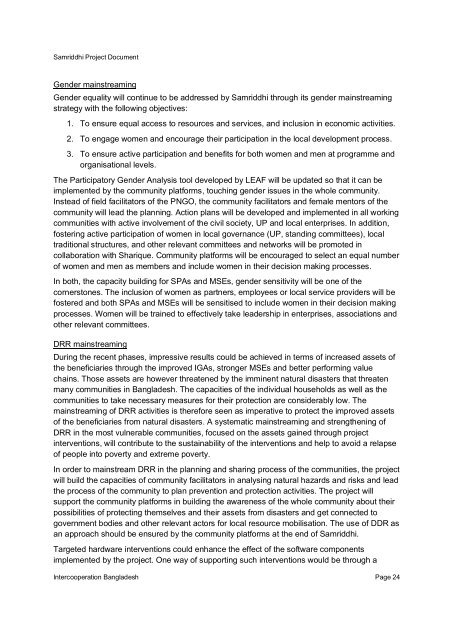Samriddhi
Samriddhi
Samriddhi
Create successful ePaper yourself
Turn your PDF publications into a flip-book with our unique Google optimized e-Paper software.
<strong>Samriddhi</strong> Project Document<br />
Gender mainstreaming<br />
Gender equality will continue to be addressed by <strong>Samriddhi</strong> through its gender mainstreaming<br />
strategy with the following objectives:<br />
1. To ensure equal access to resources and services, and inclusion in economic activities.<br />
2. To engage women and encourage their participation in the local development process.<br />
3. To ensure active participation and benefits for both women and men at programme and<br />
organisational levels.<br />
The Participatory Gender Analysis tool developed by LEAF will be updated so that it can be<br />
implemented by the community platforms, touching gender issues in the whole community.<br />
Instead of field facilitators of the PNGO, the community facilitators and female mentors of the<br />
community will lead the planning. Action plans will be developed and implemented in all working<br />
communities with active involvement of the civil society, UP and local enterprises. In addition,<br />
fostering active participation of women in local governance (UP, standing committees), local<br />
traditional structures, and other relevant committees and networks will be promoted in<br />
collaboration with Sharique. Community platforms will be encouraged to select an equal number<br />
of women and men as members and include women in their decision making processes.<br />
In both, the capacity building for SPAs and MSEs, gender sensitivity will be one of the<br />
cornerstones. The inclusion of women as partners, employees or local service providers will be<br />
fostered and both SPAs and MSEs will be sensitised to include women in their decision making<br />
processes. Women will be trained to effectively take leadership in enterprises, associations and<br />
other relevant committees.<br />
DRR mainstreaming<br />
During the recent phases, impressive results could be achieved in terms of increased assets of<br />
the beneficiaries through the improved IGAs, stronger MSEs and better performing value<br />
chains. Those assets are however threatened by the imminent natural disasters that threaten<br />
many communities in Bangladesh. The capacities of the individual households as well as the<br />
communities to take necessary measures for their protection are considerably low. The<br />
mainstreaming of DRR activities is therefore seen as imperative to protect the improved assets<br />
of the beneficiaries from natural disasters. A systematic mainstreaming and strengthening of<br />
DRR in the most vulnerable communities, focused on the assets gained through project<br />
interventions, will contribute to the sustainability of the interventions and help to avoid a relapse<br />
of people into poverty and extreme poverty.<br />
In order to mainstream DRR in the planning and sharing process of the communities, the project<br />
will build the capacities of community facilitators in analysing natural hazards and risks and lead<br />
the process of the community to plan prevention and protection activities. The project will<br />
support the community platforms in building the awareness of the whole community about their<br />
possibilities of protecting themselves and their assets from disasters and get connected to<br />
government bodies and other relevant actors for local resource mobilisation. The use of DDR as<br />
an approach should be ensured by the community platforms at the end of <strong>Samriddhi</strong>.<br />
Targeted hardware interventions could enhance the effect of the software components<br />
implemented by the project. One way of supporting such interventions would be through a<br />
Intercooperation Bangladesh Page 24
















